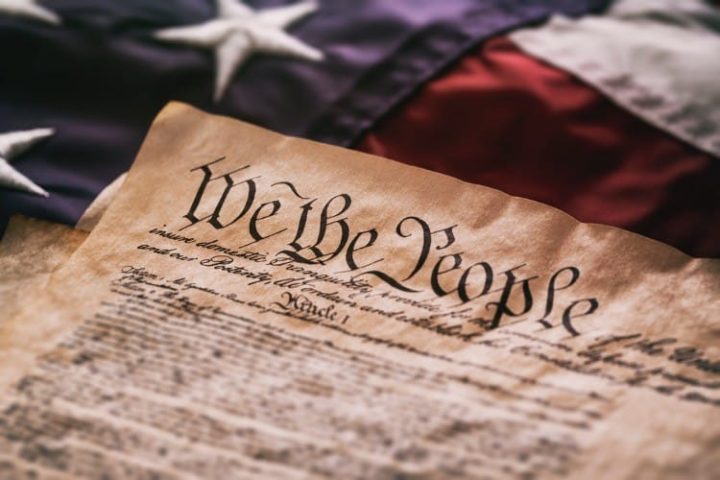
Convention of States (COS) is at it again. They’ve produced yet another document purporting to prove that nullification is not a remedy for federal tyranny. Here’s their latest attack on the 10th Amendment and state sovereignty taken from a document entitled “Is Nullification the Answer?”
The Tenth Amendment is a clear expression of a defining, foundational principle of the government designed by our Founders: that powers not delegated to the federal government by the Constitution are reserved to the states or to the people. But this, in and of itself, does not imply that individual states have the authority to independently determine when the federal government has acted outside the scope of its authority; much less does it imply that an individual state, upon reaching this conclusion, may simply ignore a duly-enacted federal law. The Tenth Amendment establishes a principle, but it does not establish a remedy or process.
I cannot understand why COS would spend so much time and millions of dollars arguing against a principle — nullification — that could most certainly and has most certainly proven effective at voiding many of the acts of the federal government that go beyond the boundaries of its authority.
Let’s take the example of marijuana. Now, whether you are for or against legalization of marijuana is irrelevant to my point. The point is that marijuana is illegal under federal law. You can’t grow it, you can’t sell it, you can’t smoke it. Period.
Take a look at these data published by the Council of State Governments:
As of 2023, 20 states and the District of Columbia have legalized the recreational adult use of marijuana. By contrast, there are 20 other states to have decriminalized marijuana-related offenses such as small quantity marijuana possession, cultivation and transfer.
That looks like quite a bit of effective nullification to me.
The COS doubles down on constitutional ignorance, this time as regards Article VI of the Constitution. Here’s what it says in that same document:
We know from Article VI that the Constitution and federal laws passed pursuant to it are the “supreme law of the land.” We also know from Article III that the United States Supreme Court is the final interpreter of the Constitution. So according to the Constitution, the Supreme Court determines whether a federal law must be considered the “supreme law of the land” when it decides whether or not that law is proper under the Constitution. The Supreme Court — not an individual state — has the final say in whether or not the federal government has acted outside the scope of its authority under the Constitution.
Where to begin?
First, Article III does not grant to the U.S. Supreme Court the authority to be the final interpreter of the Constitution. As a group wanting Americans to trust them to fix the Constitution, they sure don’t know much about it.
Here are the parts of Article III that deal with the Supreme Court’s jurisdiction. See if you can find that grant of authority that COS claims is given to the Supreme Court to be the final arbiter of what is and is not constitutional:
The judicial power shall extend to all cases, in law and equity, arising under this Constitution, the laws of the United States, and treaties made, or which shall be made, under their authority; — to all cases affecting ambassadors, other public ministers and consuls; — to all cases of admiralty and maritime jurisdiction; — to controversies to which the United States shall be a party; — to controversies between two or more states; — between a state and citizens of another state; — between citizens of different states; — between citizens of the same state claiming lands under grants of different states, and between a state, or the citizens thereof, and foreign states, citizens or subjects.
In all cases affecting ambassadors, other public ministers and consuls, and those in which a state shall be party, the Supreme Court shall have original jurisdiction. In all the other cases before mentioned, the Supreme Court shall have appellate jurisdiction, both as to law and fact, with such exceptions, and under such regulations as the Congress shall make.
I can’t find it.
Such a power wasn’t granted to the Supreme Court in the Constitution; therefore, that power is retained by the states and the people.
Now, I know that that bothers the COS people because they sure don’t like the 10th Amendment, but guess what: It’s there for a reason.
But, I want to say just a little bit more about this so-called Supremacy Clause, as well as the pretended power of the Supreme Court to be the ultimate judge of constitutionality.
First, notice the things that Article VI lists as the “supreme law of the land:”
- The Constitution
- Laws of the United States made in pursuance of the Constitution
- Treaties made under the authority of the United States
What do you find missing there? Supreme Court opinions! The opinions of the Supreme Court are not listed as being part of the “supreme law of the land,” so how in the world can their opinions be considered the definition of the supreme law of the land? That is absolutely ridiculous!
And, by the way, there is an ancient legal maxim that reads: “Expressum facit cessare tacitum.”
Translated into English, it reads, “What is expressed makes what is implied silent.”
In other words, if the Founders had intended to include Supreme Court opinions in the list of those things making up the “supreme law of the land,” then they would have done so. They didn’t, therefore they aren’t.
Next, with regard to exactly who is to have the final say on whether an act of the federal government has exceeded the authority granted to it by the states in the U.S. Constitution, the COS document says:
The Supreme Court — not an individual state — has the final say in whether or not the federal government has acted outside the scope of its authority under the Constitution.
With all due respect to whoever wrote the “Is Nullification the Answer?” document, I’d give more weight and constitutional credibility to James Madison, who had a very different view from the COS people of where the ultimate word on constitutionality is to be found. Madison wrote:
However true therefore it may be that the Judicial Department, is, in all questions submitted to it by the forms of the constitution, to decide in the last resort, this resort must necessarily be deemed the last in relation to the authorities of the other departments of the government; not in relation to the rights of the parties to the constitutional compact, from which the judicial as well as the other departments hold their delegated trusts. On any other hypothesis, the delegation of judicial power, would annul the authority delegating it; and the concurrence of this department with the others in usurped powers, might subvert forever, and beyond the possible reach of any rightful remedy, the very constitution, which all were instituted to preserve.
That clears that up. Thank you, Mr. Madison.
One last thing. The COS document claims that James Madison never suggested that a state could refuse to enforce a federal act that it believed was unconstitutional. I’ll leave you with this nugget from Federalist 46:
[S]hould an unwarrantable measure of the federal government be unpopular in particular States, which would seldom fail to be the case, or even a warrantable measure be so, which may sometimes be the case, the means of opposition to it are powerful and at hand. The disquietude of the people; their repugnance and, perhaps, refusal to co-operate with the officers of the Union….
And, as the case with the legalization of marijuana proves, the nullification by one state of a tyrannical act of the federal government doesn’t prevent a neighboring state from enforcing that federal act.
Nullification is a song that can be sung solo or by a choir.




